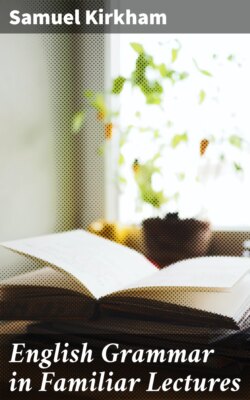Читать книгу English Grammar in Familiar Lectures - Samuel Kirkham - Страница 12
На сайте Литреса книга снята с продажи.
ENGLISH GRAMMAR.
ОглавлениеTable of Contents
ENGLISH GRAMMAR is the art of speaking and writing the English language with propriety.
GRAMMAR teaches us how to use words in a proper manner. The most important use of that faculty called speech, is, to convey our thoughts to others. If, therefore, we have a store of words, and even know what they signify, they will be of no real use to us unless we can also apply them to practice, and make them answer the purposes for which they were invented. Grammar, well understood, enables us to express our thoughts fully and clearly; and, consequently, in a manner which will defy the ingenuity of man to give our words any other meaning than that which we ourselves intend them to express. To be able to speak and write our vernacular tongue with accuracy and elegance, is, certainly, a consideration of the highest moment.
Grammar is divided into four parts;
1 ORTHOGRAPHY,
2 ETYMOLOGY,
3 SYNTAX,
4 PROSODY.
ORTHOGRAPHY teaches the nature and powers of letters, and the just method of spelling words.
ORTHOGRAPHY means word-making, or spelling. It teaches us the different kinds and sounds of letters, how to combine them into syllables, and syllables into words.
As this is one of the first steps in the path of literature, I presume you already understand the nature and use of letters, and the just method of spelling words. If you do, it is unnecessary for you to dwell long on this part of grammar, which, though very important, is rather dry and uninteresting, for it has nothing to do with parsing and analyzing language. And, therefore, if you can spell correctly, you may omit Orthography, and commence with Etymology and Syntax.
Orthography treats, 1st, of Letters, 2ndly, of Syllables, and 3dly, of Words.
I. LETTERS. A letter is the first principle, or least part, of a word.
The English Alphabet contains twenty-six letters.
They are divided into vowels and consonants.
A vowel is a letter that can be perfectly sounded by itself. The vowels are a, e, i, o, u, and sometimes w and y. W and y are consonants when they begin a word or syllable; but in every other situation they are vowels.
A consonant is a letter that cannot be perfectly sounded without the help of a vowel; as, b, d, f, l. All letters except the vowels are consonants.
Consonants are divided into mutes and semi-vowels.
The mutes cannot be sounded at all without the aid of a vowel. They are b, p, t, d, k, and c and g hard.
The semi-vowels have an imperfect sound of themselves. They are f, l, m, n, r, v, s, z, x, and c and g soft.
Four of the semi-vowels, namely, l, m, n, r, are called liquids, because they readily unite with other consonants, and flow, as it were, into their sounds.
A diphthong is the union of two vowels, pronounced by a single impulse of the voice; as oi in voice, ou in sound.
A triphthong is the union of three vowels pronounced in like manner; as, eau in beau, iew in view.
A proper diphthong has both the vowels sounded; as, ou in ounce. An improper diphthong has only one of the vowels sounded; as, oa in boat.
II. SYLLABLES. A Syllable is a distinct sound, uttered by a single impulse of the voice; as, a, an, ant.
A word of one syllable, is termed a Monosyllable; a word of two syllables, a Dissyllable; a word of three syllables, a Trisyllable; a word of four or more syllables, a Polysyllable.
III. WORDS. Words are articulate sounds, used by common consent, as signs of our ideas.
Words are of two sorts, primitive and derivative.
A primitive word is that which cannot be reduced to a simpler word in the language; as, man, good.
A derivative word is that which may be reduced to a simpler word; as, manful, goodness.
There is little or no difference between derivative and compound words. The terminations or added syllables, such as ed, es, ess, est, an, ant, en, ence, ent, dom, hood, ly, ous, ful, ness, and the like, were, originally, distinct and separate words, which, by long use, have been contracted, and made to coalesce with other words.
